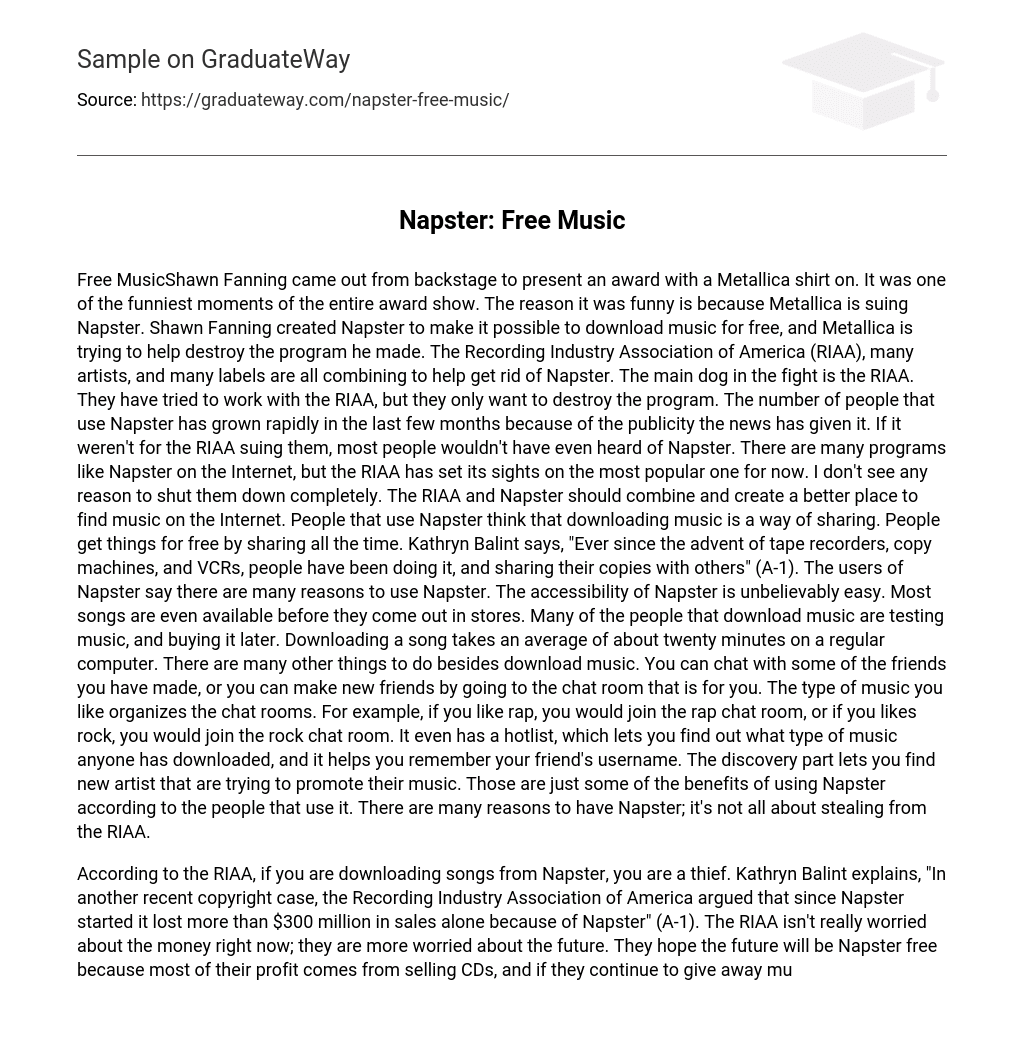At an award show, Shawn Fanning surprised everyone by wearing a Metallica shirt, which is ironic considering that Metallica is currently suing Napster. The Recording Industry Association of America (RIAA) and other artists and labels are working together to eliminate Napster. While the RIAA has tried negotiating with Napster before, their main goal is to completely dismantle the program. Interestingly, due to media coverage of the lawsuit, Napster’s popularity has actually increased in recent months. Without the legal action taken by the RIAA, many people would have remained unaware of Napster’s existence. Although there are many similar programs available online, the RIAA has chosen to prioritize shutting down the most widely used one at this time. However, I believe that there isn’t a strong reason for completely shutting down Napster. Instead, I suggest that Napster and the RIAA work together to create an improved platform for music sharing on the internet. Many users see downloading music as a form of sharing—a concept deeply ingrained in our society—as noted by Kathryn Balint (A-1). Users highly value Napster for its easy accessibility in discovering and obtaining music. One advantage it provides is early access to songs even before they are officially released in stores. Many users who download music often use Napster as a way to sample songs with intentions of purchasing them later on.
Napster, a platform for downloading music, offers more than just that. In addition to the typical twenty-minute download time on a regular computer, Napster provides genre-specific chat rooms where users can connect with friends and meet new people who share similar music interests. For example, rap enthusiasts can join the rap chat room while rock lovers can participate in the rock chat room. Also, Napster has a hotlist feature that allows users to explore others’ music selections and remember their friends’ usernames. Moreover, Napster serves as a platform for up-and-coming artists seeking exposure and promotion for their work, contributing to music discovery. These mentioned benefits demonstrate that Napster is not solely focused on illegally obtaining music from the RIAA; it serves multiple purposes.
According to the RIAA, those who download songs from Napster are considered thieves. They argue that Napster alone caused a loss of over $300 million in sales (A-1). However, the RIAA is more concerned about the future than immediate monetary losses. Their main concern is a future without Napster because most of their profits come from selling CDs. If music continues to be given away for free, people will have less motivation to purchase it. Additionally, they emphasize that if there is no profit in creating music, talented artists will stop producing it. The fate of music currently rests with the courts as shutting down Napster is an ongoing battle and even if they succeed today, a new program will inevitably emerge tomorrow. The RIAA hopes that closing Napster will lead to legislation against all forms of pirated music.
A possible resolution to the conflict between Napster and the RIAA would involve developing a program that satisfies both parties. Both sides being financially compensated would likely result in their satisfaction. Rather than attempting to dismantle Napster, the recording industry should consider investing in it (Guterman 3). Destroying Napster would only lead to ongoing battles until the RIAA eventually gives up. A suggestion is for the RIAA to implement a monthly fee for downloading music. Many individuals, including myself, are willing to pay around twenty dollars for a month’s worth of downloads. According to a recent survey by Webnoise, 58 percent of Napster users expressed their willingness to subscribe to a monthly fee (Segal A1). With this high demand for paid subscriptions, it makes sense for the RIAA to explore potential revenue from this new technology rather than seeking its destruction. Furthermore, the unified platform could generate income through selling products like T-shirts and concert tickets with endless profit possibilities. With an increase in computer usage, business sales would skyrocket and major sponsors like Nike or Pepsi would undoubtedly want association with the site. The potential revenue for the RIAA could be astronomical. Paying a monthly fee for music is undeniably the future pathway.
Ending Napster may lead to an endless cycle of battles, with no resolution in sight until one side gives up. Guterman suggests that although Napster’s demise is possible, the knowledge it has brought will persist indefinitely. By fostering collaboration between opposing factions, they could potentially achieve something remarkable. The era of computers is firmly established and is expected to continue for the foreseeable future.
The Works Cited entry includes the following sources:
– Balint, Kathryn. “Copyrights Take a Licking on the Net Frontier.” San Diego Union-Tribune 8 Sep. 2000, ed. 1,2,7.:A-1.
– “David Boies: The Wired Interview.” Wired. 8 Oct. 2000: 18 Oct. 2000 http://www.wired.com/wired/archives18.10/boies.html.
Guterman, Jimmy. “Why Labels Should Love Napster.” The Standard 24 July 2000: 23 Oct. 2000 http://www.thestandard.com/article/display/0,1151,16966,00.html.
Hartigan, Patti. “Napster Is Stirring Piracy Controversy.” Boston Globe 24 Mar. 2000, E1.
Huhn, Mary. “Music Biz: It’s War Web Sites Hit With Piracy Lawsuits.” New York Post 10 June 1997.
Mann, Charles C. “The Heavenly Jukebox.” The Atlantic Monthly Sep. 2000: 39-59.
“Napster Has History On Its Side – Kind Of” from U.S.News on September 9, 2000; accessed on October 25, 2000 at http://www.usnews.com/usnews/issue/000918/digital.b.html.
The New Copyright Law. Longwood, FL: Gary H. Becker, 1982, 1985, 1992.
Segal, David. “An Upside To Music Downloads Industry Smells Profit In Tunes Spread On Web.” Washington Post 22 June 2000, final ed.: A1.
Woody, Robert Henley III, and Robert Henley Woody II. (1994). Music Copyright Law In Education. Bloomington, Indiana: Phi Delta Kappa.





